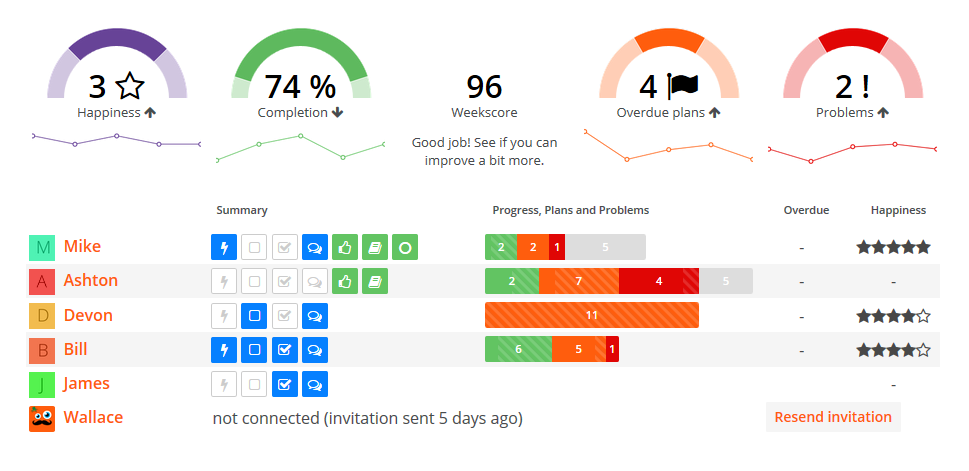If businesses operated on action movie rules, the process of assembling a team would look like something from The A-Team. Though headhunting is indeed an important part of building your own winning team, you don’t need fresh blood for your company to stay rosy-cheeked.
With corporate mercenaries, you get exactly what was promised. With your own trusted team, you get double the amount. We at Weekdone, would like to help you to form your own A-Team.
Remember these 8 insights, and the team of your dreams might become a reality.
1. Goals should be inspirational but realistic too
It is important to make your employees feel they are a part of a larger whole. Let them believe they are changing the world, and maybe one day they will. Don’t be too vague in your objectives.
“Become the largest credit counselling agency in Atlanta” is better than “Become the best company in the world”. We all want to be the latter, but we need at least some details for our minds to fill in the blanks.
Also, don’t overdo it. Larger-than-life projects don’t typically instill much confidence, and the sheer scale might scare even more experienced workers. So, be grounded. Everybody knows you should not have your head in the clouds, especially if it’s the head of a head of the company.
2. Be there for your team
Bruce Tuckman’s team-development model celebrates its 50th birthday this year, yet it remains as relevant as ever. In 1965, Tuckman proposed that every new team goes through four distinct stages of growth.
At first, it is dependent on its leader. You may be required to lead with a directing style at the very beginning. Be with them, help them through difficult times and teach them to avert crises. It is important to realize what qualities you should have as a leader, and improve the ones that you are lacking.
Inspire them with you confidence, become an influencer. Tuckman’s model promises that it will get easier for you with time to reap what you sow, especially as you build your winning team.
3. But don’t try to babysit them
Being a leader does not automatically make you a walking manual. You don’t have an answer to every question, nor should you. More often than not, you are as clueless of the solution as your employees. So when the worker comes to you so you could explain what to do, instead ask him – “And what would you do?”
We don’t discourage employees from asking questions, but they have to form their opinions and have strong gut instincts. By letting your team have at least some degree of autonomy, you make sure that your company does not disintegrate on the very first day you call in sick.
4. Trust is a finite source…
The key to trust is reciprocity. Trust your employees, and they will trust you in return. It doesn’t sound complicated, but many don’t know where to start. We recommend giving your employees projects that will require decision-making. Show that you trust them enough to work independently.
This puts some additional pressure on you as a leader, as well. Should you go back on you promise or be unreliable in any way, you will be left with some fences to mend. It is easier to lose trust than it is to earn it.
5. And so is passion
Passion towards the projects is what keeps our inner machinery oiled. It is not something we can summon at will, so take pains to keep it alive in your team. And to make that, you have to know your team, ins and outs. What drives them? What are their interests? Do they feel motivated by whatever they’re working on?
Consult with your teammates and don’t be afraid to reassign them to something new. If a project doesn’t pan out, find someone who has a fresh perspective on it. Make sure the seats they sit in are the right ones, and if not, reshuffle the deck.
6. Establish a two-way communication
Monologues are only good on stage. In real life, no one will applaud you if you keep talking drivel without letting anyone intervene. Sometimes, the best leaders are not those who are great speakers but those who are great listeners.
Conversation goes both ways, and some of the more successful ideas were born in discussions. Good organizational communication is incredibly to develop with your team. Brainstorm ideas together, ask for your employees’ opinion about what would help you win as a team. Encourage them to learn to say no.
And when we talk about conversation, we mean old-school face-to-face communication. Chats and emails are only good for quick exchanges. If you work in the same building, make sure to walk down the hall and talk to everybody directly.
7. It’s better to be critiqued than ignored
No matter how efficient and dedicated an employee is, his productivity will stagnate if you don’t offer any input. Many mistakenly think that it is better to say nothing rather than something negative. True, you have to take the emotional maturity of your team into account, but most adults react surprisingly well to being critiqued.
By giving your informed opinion, you show that you care about your employees – and their work. While it’s not necessarily good to mime Steve Jobs and walk around criticizing the smallest minutiae, we all can learn a thing or two from the guy.
8. Accountability is everything
It is vital to establish accountability in your company for you to win as a team. Team reports are an integral part of work management, and the sooner your team will get used to filing in weekly reports, the better the results will be.
Old and proven ways are not necessarily the best ways. For example, some of the more successful CEOs are content with just 30-minute meetings once a week. Others scratch them altogether. If you feel that you want to know more about what your team is up to, you also may want to check out some modern team management tools.
For example, Weekdone lets you assess and review your team and constantly check on overall progress. [Sign up here], and start building the team you always wanted.



